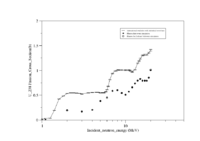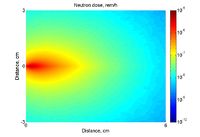Difference between revisions of "NNSA Center 2012"
| Line 1: | Line 1: | ||
| − | They will support "development of advanced simulations and measurement techniques leading to improved radiation and particle detection methods in terms of energy, temporal and spatial resolution". | + | [[File:Example.jpg]]They will support "development of advanced simulations and measurement techniques leading to improved radiation and particle detection methods in terms of energy, temporal and spatial resolution". |
| Line 17: | Line 17: | ||
[[File:ENDF_GEAN4_U238_fxsection.png | 200 px]] | [[File:ENDF_GEAN4_U238_fxsection.png | 200 px]] | ||
| + | [[File:pic1.jpg| 200 px]] | ||
INTERNATIONAL EVALUATION OF NEUTRON CROSS-SECTION STANDARDS, INTERNATIONAL ATOMIC ENERGY AGENCY,VIENNA, 2007 [[File:U238-xsection.pdf]] | INTERNATIONAL EVALUATION OF NEUTRON CROSS-SECTION STANDARDS, INTERNATIONAL ATOMIC ENERGY AGENCY,VIENNA, 2007 [[File:U238-xsection.pdf]] | ||
Revision as of 00:12, 5 March 2012
 They will support "development of advanced simulations and measurement techniques leading to improved radiation and particle detection methods in terms of energy, temporal and spatial resolution".
They will support "development of advanced simulations and measurement techniques leading to improved radiation and particle detection methods in terms of energy, temporal and spatial resolution".
GEANT and MCNPX are two simulation packages commonly used by researchers in Nuclear physics to develop experiments and interpret experimental resuls. While GEANT4 is a publicly available open source package, MCNPX requires a license and may only be available as an executable to those who are not elibigle for a source license. GEANT and MCNPX have substantial overlap in the models and data they employ to predict how particles interact with matter. For example, both utilize the Evaluated Nuclear Data FIle (ENDF) from the National Nuclear Data Center as input to their simulation programs.
Historically, MCNPX has been a more complete resource for simulation nuclear reactions than GEANT. Recently however, GEANT4 has been gaining ground and becoming a testbed for such models as the Bertini Cascade model (INCL/ABLA). Although each has their stengths and weaknesses,
nuclear physics students who desire to develop a simulation program, but are not eligible for the MCNPX source code, rely on GEANT4. As a result, GEANT4 has a large development community and more readily used as an education tool for universities who train international students as well as
US students for entry into the US nuclear workforce.
Students working at the Idaho Accelerator Center have a long history of using MCNPX to interpret their experimental results. A recent effort has been made to begin using simulation tools in the design of experiments. Figure 1a is an example of using MCNPX to determine the neutron flux from a proposed accelerator based neutron source. Students in the center have been using GEANT4 to develop an efficient fission chamber. Figure 1b is an example of one student comparing the U-238 neutron induced fission spectrum predicted by the ABLA model in GEANT4 to the IAEA's data evaluation. As an NNSA center of excellence, students will be given the opportunity to contribute to the development of simulations by contrasting their predictions with experimental results.
I need half a page about how GEANT4 can be used for educational purposes and how it will help to increase the number of nuclear physicists in the US. This is for NNSA Center of Excellence proposal.We are not doing anything innovative, but we can say we at least will use it to train students. I am going to add another half page about MCNPX. If you know the main difference between them - please share :)
The Figure below compares GEANT4's U-238(n,f) model with the IAEA's international evaluation
INTERNATIONAL EVALUATION OF NEUTRON CROSS-SECTION STANDARDS, INTERNATIONAL ATOMIC ENERGY AGENCY,VIENNA, 2007 File:U238-xsection.pdf
absolute f_xsection in the table 7.1 p.91
Data set # 646 pr 648
646: Li Jingwen et al,INDC(CPR)-009 (1986) 7
648:R.K. Smith et al. (1956),Personal communication, G. Hanson (1975)
Table : energy range of interactions for photon neutron and proton.

